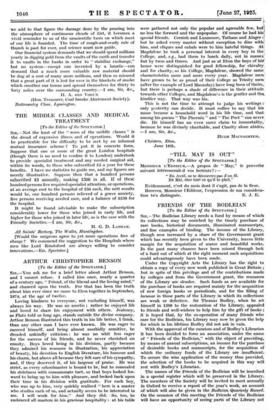ARTHUR CHRISTOPHER BENSON [To the Editor of the SPECTATOR.] SIH,—You
ask me for a brief letter about Arthur Benson, and I cannot refuse. I called him once, nearly a quarter of a century ago, Friend, of the liberal and the loving mind," and chanced upon the truth. For that has been the truth about him ever since we came to Eton together in September, 1874, at the age of twelve.
Loving kindness to everyone, not excluding himself, was always his way. He was no ascetic ; rather he enjoyed life and loved to share his enjoyment with others. Jealousy, as Plato told us long ago, stands outside the divine company. Arthur Benson illustrated this truth in his life better, I think, than any other man I have ever known. He was eager to succeed himself, and being almost morbidly sensitive, he dreaded unkindly criticism : he was no whit' less eager for the success of his friends, and he never cherished an enmity. Boys loved being in his division, partly because they admired his resource in illustration, his appreciation of beauty, his devotion to English literature, his humour and his charm, but above all because they felt sure of his sympathy; and, if they deserved it, of his largesse of praise. He was strict, as every schoolmaster is bound• to be, but he concealed his strictness with consummate tact, so that boys-looked for- ward to being up to him with pleasure, and looked back upon their time in his division with gratitude. For each boy, who was up to him, very quickly realised " here is a master who studies each of us, and actually seems to be interested in me. I will work for •hirn." And they did. - So, too, he embraced all masters. in his gracious hospitality : at his table
were gathered not only the popular and agreeable few, but no less the forward and the unpopular. Of course he had his special friends. Cornish and Luxmoore, Tatham and Ainger : but he asked every master without exception. to dine with him, and cliques and cabals were to him hateful things. At Magdalene he took a personal interest in every boy in the College, and, e.g., had them to lunch daily, not in masses but by twos and threes. And just as at Eton the boys of his! house were distinguished for good fellowship, for' chivalry and for charity, so his College, Magdalene, showed the same characteristics more and more every year. Magdalene men have grown to be as proud of their College as Trinity men' (after the example of Lord Macaulay) have long been of theirs, but there is perhaps a shade of difference in their attitude towards other Colleges, and Magdalene's is the gentler and the, kindlier way. That way was his.
This is not the time to attempt to judge his writings :
only posterity can decide: It must suffice to say that his name became a household word in his -life time, and that among his poems " The Phoenix " and " The Poet " can never, die. He himself has an even surer claim to immortality, because he was divinely charitable, and Charity alone abides. —I am, Sir, &c.,,
Cloisters, Eton. June 18th. HUGH MACNAGHTEN.










































 Previous page
Previous page